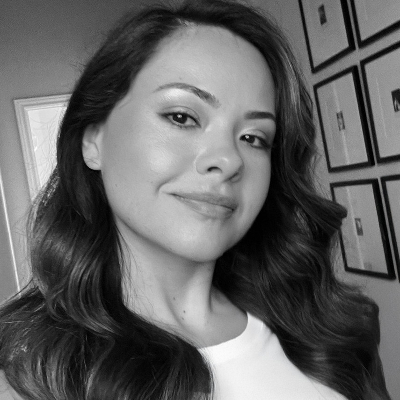Hablemos, escritoras: Episode 543
The body of work of Argentine journalist, writer, and editor Leila Guerriero is fundamental. Today we are pleased to bring her to you. Leila Guerriero began in the field of journalism in 1991 at the magazine Página/30, part of the newspaper Página/12. Since then, her work has been published in various media outlets such as La Nación, Rolling Stone, El País, and El Mercurio. Her work takes in the history of Argentina and the contemporary world from different angles, and has earned her awards like the Fundación Nuevo Periodismo Iberoamericano prize in the text category for her chronicle El rastro en los huesos, the Diploma of Merit in the “Chronicles and Testimonies” category awarded by the Fundación Konex, and, in 2019, the XIV Premio de Periodismo Manuel Vázquez Montalbán.
This is an adapted excerpt from the podcast Hablemos, escritoras, hosted by Adriana Pacheco.

Adriana Pacheco: Over time I’ve had the opportunity to read several of Leila Guerriero’s books, and I’m very happy to welcome her today. Leila, thank you so much for accepting this interview.
Leila Guerriero: No, please, thank you so much, Adriana. It’s a pleasure to be talking with you this morning here from my studio.
A.P.: Let’s start with your profile as a journalist. What intrigues you the most about doing journalism? Where does your curiosity to ask people questions and listen to them come from?
L.G.: Well, I think it’s very hard to trace where it comes from, let’s say, the source of desire—especially such a strong, potent desire that ends up becoming something you dedicate your life to. I think there’s a lot of curiosity, a real intrigue, yes, to enter and listen to other people’s lives, to enter worlds that would otherwise be very difficult to access. I never grew up with the idea of being a journalist; I always grew up with the idea of writing. I always wrote and initially what I wanted to be was a fiction writer, and then, well, I became a journalist and never again wanted to be anything else. And so, two very strong drives came together in journalism: one was writing, and the other was curiosity about other people’s lives, and the desire to get out of myself, out of my world, out of my own small universe, like the one we all have.
A.P.: Really listening to others isn’t easy. How do you deal with the idea of not judging when you approach someone? How do you manage your own prejudices?
L.G.: I don’t think it’s possible to completely rid yourself of prejudice, but I am aware that this is at the heart of the craft—going in as open and flexible as possible to tell a story, whether it’s a profile or a more choral chronicle that involves the story of many people. There’s a tool that journalism gives that’s really interesting in this regard, and for me at least, it’s that I never place the camera in just one spot. If I’m going to interview someone for a profile, I never interview just that person. I also speak with their close ones, with people who don’t think like them, with people who’ve criticized them if we’re talking about a public figure. And if it’s someone who isn’t so publicly known, then I also find people who don’t seem to be particularly sympathetic toward them. So that same tool that comes from journalism—contrasting voices, shifting perspectives, reflecting a range of opinions—is something that helps so that, as long as you do good reporting and have patience and a flexible outlook, it allows you not to marry yourself to just one point of view.
A.P.: Right, that’s another side of prejudice—the preconception interviewees have about themselves.
L.G.: Yes, absolutely. I think it’s crucial to listen not only to what is said, but also how it’s said, and also to what isn’t said, or the slip-ups, or the moment someone stops right before saying something, as if they regret it. I think listening in a journalistic interview is very exhausting, and I believe it has to do—at least in my case—with that: trying not just to listen to what’s being said, but also to read in the moment all this subtext, and also when I transcribe the interviews—because I do the transcriptions myself, I don’t have anyone else do them—and in listening back, a lot of things come up that end up being very useful later when writing the piece. Like in my interview with Bruno Gelber, a very talented Argentine performer, who in our first or second meeting told me the same stories I’d already read about him in other interviews. But I wanted to go much further. But then there was also something else Bruno did by telling me those same stories again and again—I saw that in that repetition, there was something to be read: an attempt to captivate the other.
A.P.: Completely fascinating. I’m thinking now, as I listen to you, about how much the way people are interviewed has changed over the decades. Do you feel there’s been a change in how journalism is done today?
L.G.: When I worked for El País Semanal in Spain and the Sunday magazine of La Nación, I had already been using a system that involved spending two or three months on a very long, in-depth article—so, a lot of reporting work. And during those three months, I’d do things like a profile of an actor or actress or someone involved in a topic, some profile that could fit in a Sunday magazine. And I’d turn that profile around quickly with a single very long interview, then I’d transcribe it, sit down, write it, and not talk to anyone else close to that person. Whereas the other in-depth chronicles were much more choral, and I went into the field many times. It’s what’s now also called “narrative journalism,” which really comes from an older tradition like Operación Masacre, the book published here in the 1950s by Rodolfo Walsh. And now there are publishers who have dedicated imprints or created prizes to reward this kind of journalism.
A.P.: Leila, your book Teoría de la gravedad made me wonder whether you also observe yourself constantly as a journalist when you approach subjects that are too intense or too close to you.
L.G.: I think I’m very self aware, but not centered on myself. When you do this job, you get used to the fact that what matters is the other person’s story, not your own. But I am very attentive to how the machine works—the machine of observation. I say machine, and it sounds a bit cold, like a thing you set in motion and have to understand how it gets going, what happens when it slows down, whether it can be sped up, whether it can be stimulated somehow. And I keep all of that in mind, I think about it. Sometimes I suffer from it when there are plateau moments, when everything feels a little less interesting. For example, when you finish writing a very long, laborious piece, or when you close a book—when you finish writing a book, I mean—there comes this sort of sinkhole where it feels like nothing resonates anymore, like you’ve left it all on the page. Also, when I write, I try to detach myself from thinking about how the text will be received, because if I start thinking too much about that, I feel I might impose something akin to a type of self-censorship. That’s fundamental to me.
A.P.: Teoría de la gravedad contains ninety-six condensed texts that talk about contradictions, ambiguities, the intimate and the collective, attachments, and losses. What did writing this book mean to you?
L.G.: Yes, that book is a compilation of the more intimate or existential columns I published and continue to publish on the back page of the newspaper El País in Spain. When I was offered the opportunity to write this column, I knew I was going to try to create a sort of mural with two combined landscapes. One was a landscape of social and political reality, etc., in Latin America as much as possible, and the other was something that columnists I had read and who inspired me had done—like Clarice Lispector, the Brazilian writer, who had a column in a Brazilian newspaper and wrote a lot about her experiences of being alive, her melancholy, her joy, her amazement at the sight of a tree. She transformed all of that into something very universal because she told it from her deeply internal perspective and managed to turn it into something that resonated with many people—she turned a personal experience into one shared by many. A lot of people could read that—I realized it because I would read her and think something like that could happen to me. So I began writing these columns for El País in that second, more existential vein.
A.P.: Let’s talk about La llamada. It’s the story of Silvia Labayru—this very dark, painful chapter in Argentine history—but at the same time, it’s a story that cannot be avoided or left unexamined. Tell us about this book, and also about the matter of those who were detained, tortured—women who were raped and later went on to experience another kind of torture on the outside, which was censorship and social condemnation.
L.G.: Yes, La llamada was a complex book. All books are complex when it comes to the writing process. This one is a profile of Silvia Labayru, a militant of the Montoneros, which was a left-leaning, Peronist-rooted armed group here in Argentina in the 1970s. She was kidnapped by the military when she was twenty years old and five months pregnant. There she was tortured, forced into slave labor, and raped repeatedly. When she was released in 1978 and went into exile in Madrid, she found that the hell of the ESMA hadn’t ended—that there was another hell, which was rejection from her peers. She carried the suspicion, as many others did, of having collaborated with the military in exchange for being released from prison. This rejection wasn’t limited to Silvia Labayru. There were others, like Marta Álvarez and Lidia Vieira—many of them women who had been held captive with Silvia.
A.P.: A great book, a remarkable investigation. And let’s close this conversation by talking about a magazine: Gatopardo. You’ve been at the helm of it as editor and part of the team for a long time. What has Gatopardo meant to you?
L.G.: For me, it’s an incredibly important magazine. First—and I can say this beyond my role as editor at the magazine—I started contributing to Gatopardo back when it was produced in Colombia with Rafael Molano as editor. I pitched a series of stories and it was wonderful to publish there. It felt like collaborating with The New Yorker but in Spanish. It was the magazine we all wanted to be published in. The magazine still holds the same standards and the same approach to deeply developed stories, giving journalists plenty of time to do their work—not asking for things from one week to the next, but giving them months to do photography work that’s in dialogue with the text. The magazine has a Latin American vocation, which means we publish stories from Ecuador, Brazil, Argentina, Chile, from all over the region, and also from Spain.
A.P.: Absolutely. Gatopardo is a magazine many of us grew up with intellectually. Well, thank you so much, Leila, for this interview and for your time.
L.G.: Thank you so much, Adriana, for reading, for inviting me to share this time, and for such a lovely conversation.
Translated by Andrea Macías Jiménez
You can listen to the full interview on Hablemos, escritoras.



